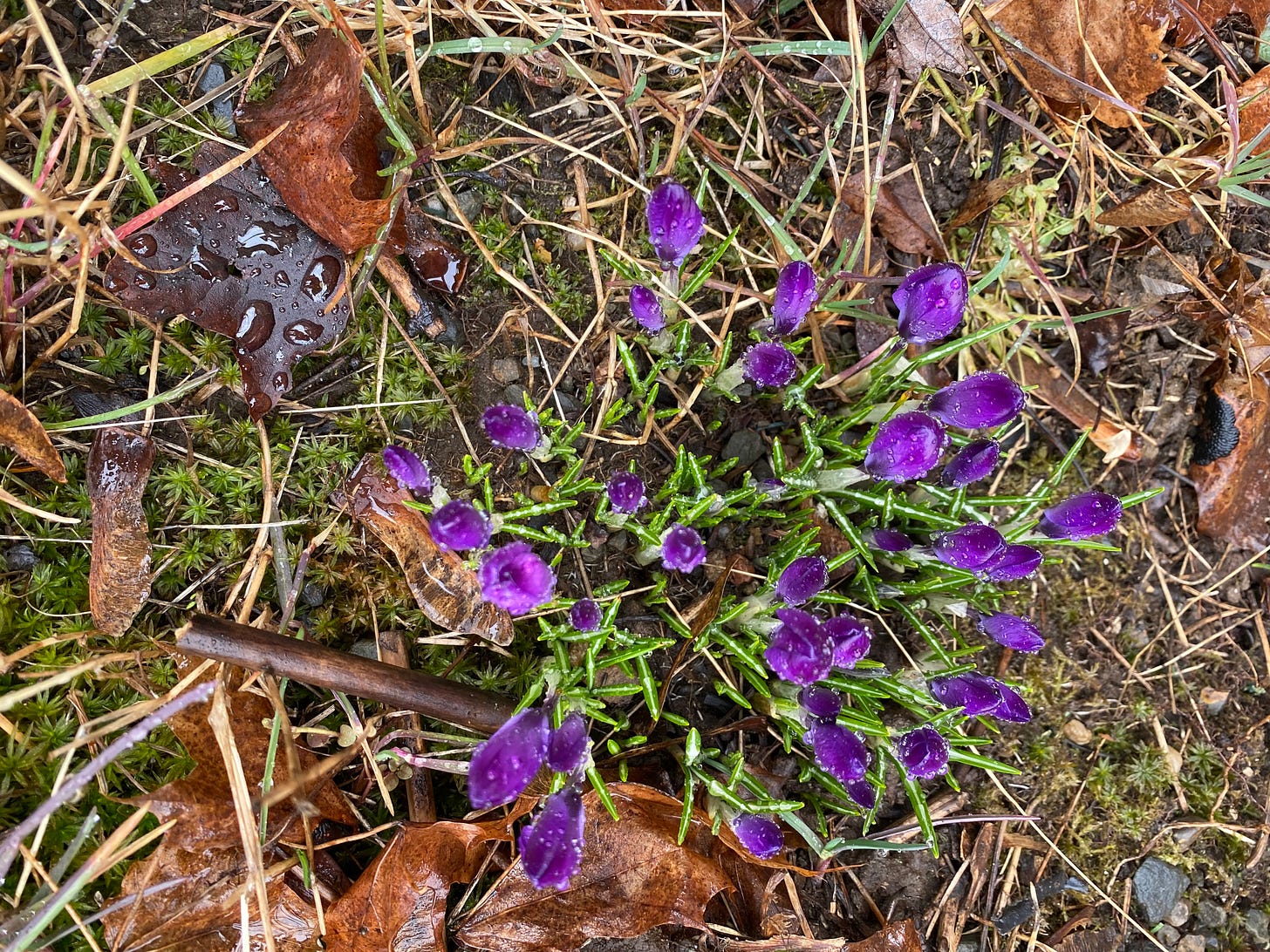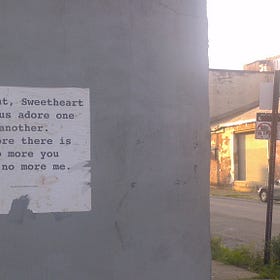Just as April slid in on its slushy boot soles with crocuses sprouting through the grommets, I got an email from the head of my training program, telling me that one of my teachers and my last mentor, Chris Hammer, had died.
I knew she’d been battling cancer for some years now. But I hadn’t seen her since November 2023, when we last had a zoom call. I wish I could remember what we talked about that time, but I can’t. I only remember that every time we talked, she had some really solid wisdom to impart from a place of grounded grace.
And I’ve talked about her over the years, too. Her concept of safety and efficiency is one I’ve taught to clients over and over, written about when outlining the principles of our work, and recently cited in my series about the current US government and how to respond to it.
In the email, we were asked to send any thoughts we wanted to share about Chris, and of course, I wanted to share many thoughts, but as usual, I had to wait until I’d gotten my act together to write out all the thoughts. Luckily, it’s still only been a few days, days of this canonically cruel month which I wish I hadn’t come to associate with death and loss.
As if by some dark magic
In which I lose an old friend, theatre colleague, and irreplaceable gem of a human far too young, and the world loses her, too
Therefore, some words
In my first week of training in Rubenfeld Synergy Method, which was my original Somatic Therapy certification path, I had a hard time. During that week, Chris Hammer was one of the people on the faculty who made me feel a lot of hope, and who helped me stay in spite of my skepticism.
Chris was a developmental physical therapist, and she brought expertise in childhood development, disability, anatomy, and attunement to the table. She was an artist, too; I didn’t know that right away but in hindsight it radiated from her. So many of the things I learned and took with me into my practice came from her. Partly, this was due to my initial snobbery: I gravitated toward the practitioners who seemed the most grounded in academic knowledge, and who spoke with the greatest specificity. But later, Chris would remain one of my favorite teachers for her gentleness, patience, emotional incisiveness, a loving presence.
From 2008 to 2012, when I studied, I was also working heavily with my trauma for the first time. Partly as a result of that, I was always a little too open with people who seemed like they could help. I remember telling Chris very early, maybe even in that first week as I was struggling, that she reminded me physically and gesturally of my mother; she even had a New Jersey accent inflected by Italian-Americans. I gravitated to her partly for that reason, too: there was a sadness and a longing in me, seeing this woman who evoked my mother in my body, but whose way of moving in the world was such a contrast. She was so accessible, so present. I remember all the times I went up to her to ask about something difficult, or talk about something I’d discovered. Never once did I feel that she didn’t have time for me, that she didn’t fully understand what I was saying, that she wouldn’t have, if not an answer for me, at least a sense that she had considered my question carefully and cared deeply about my experience.
I related to her, hard, because I aspired to have that kind of equanimity combined with humility, that ability equally to admit you don’t know, and to say the thing that you do know with conviction but without bravado. She built that invaluable bridge for me, between my over-intellectual skepticism and my empathy, my distrust of pseudoscience and sentiment and my ability to authentically connect, if I could just pay attention to the truth of my body. Chris Hammer was one of the first people I didn’t see a conflict in about that. In the service I was able to stream, her son quoted one of Chris’ bits of wisdom: “It’s an ‘and’ thing.” That hit hard in my knowledge of her and what she taught me. I could be book-smart and have good instincts; I could think critically and let myself be moved. I could feel alienated by sentimentality and allow and encourage another’s deep resonance with it, without judging. There was room, she seemed to say, for all of it.
In the past few years, I did a few mentoring sessions with Chris as I was making up my necessary hours for Somatic Therapy. They were all during the pandemic, and thus all virtual. I had begun working with my clients — and my own therapist — virtually as well, and I was learning how effective even an online presence could be to a client. Unsurprisingly, Chris’ ability to be fully present wasn’t diminished at all by Zoom.
Nor did it seem diminished by the cancer that would ultimately take her life. The last few times we talked, as I said, I don’t recall the content I was bringing to the session. But I do remember her sharing how, if anything, her illness had increased her sense of presence, of now-ness. She had touched her own mortality, and if there was one thing she knew, it was that she was going to be here in every moment, however many she had left.
I wish she had had more.
I do remember one mentoring session I had with Chris very well. It was during a time when the Somatic Therapy faculty and staff were talking a lot about the concept of orientation: a critical nervous system function and a common tack our bodies use to bring us back to the present moment when something throws us off. (You can even see in the language: “tack” is something sailboats due to course-correct. When we’re “thrown off” we have to right ourselves.)
I’d been talking about feeling incompetent or at sea sometimes with clients, and how much of that feeling traces back to childhood stuff. You know, light topics. Chris asked me, gently, to try and talk to the part of me that feels that. Just then, I saw a shadow move past the door behind her on the screen and was distracted enough to need to know what it was.
It was just a dog passing by, but because I was talking about tough stuff, my mind had slid to something easier to deal with. Plus, my nervous system was wound up, and my brain went straight to wondering what the moving thing in the distance was. Immediately I started judging myself for it.
Chris not only normalized what had just happened, but used the moment to teach and to heal. No sooner had I found out what the moving thing was but I was apologizing and giving myself grief for avoiding the topic. But Chris described what I’d instinctually done as orientation, and orientation as a skill. It’s something our bodies know: how to oscillate attention between the inner life and the outer, how to check our surroundings to make sure we’re safe, then return to the difficult topic.
Like so many skills our bodies learn in their development, this one can be harmed by trauma: we forget how to lift ourselves out of dysregulation, how to focus on something else and get our bearings, how to orient to a tree in the distance, to the person in front of us, to our own feet on the ground. Or how to return to the difficult feelings after running away: we escape the feelings any way we can and have a hard time coming back to face what needs facing.
Not only had what I’d done not required apology, Chris suggested, but it was a skillful handling of tough emotions. It was as if I were sitting around a fire and preparing to tell an important story, but first, I had to check and be sure we all were safe from whatever might be outside the circle of light. Orienting away, then orienting back again. Knowing for sure where I am, so that I may begin.
That oscillation, that ability to be grounded while also being a dynamic system, is something Chris exemplified every day of her life, as near as I can tell. Groundedness, she knew, is not stillness: it’s the rolling, rocking motion of touching outward, then returning to self, communicating across the gap. Chris wrote a blessing for groundedness, which was read out at her service. She was a lover of poetry too, and I thought of this, from Theodore Roethke:
Of those so close beside me, which are you? God bless the Ground! I shall walk softly there, And learn by going where I have to go.
Chris has moved to whatever is next, and moved there, by all accounts, with grace and love and joy and fear and sorrow, and while we cannot follow still we try to learn from her the grace of that movement, the lessons she touched us with, the truth of her that all who were touched by her will carry forward.
Gentle travels, Chris. You are so loved.





